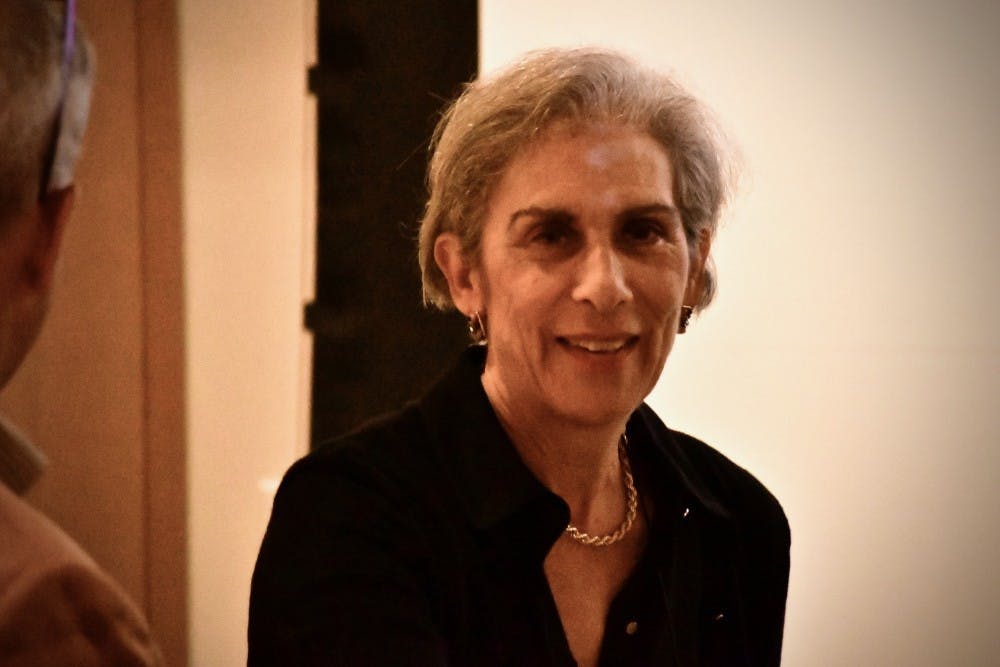Content Warning: The following column contains mentions of racism, ableism, and violence.
The following is a guest contribution and reflects the author’s views alone. For information on how to submit an article to the Opinion Section, click here.
It’s an invariable cycle: a professor says something offensive or contentious, and immediately students, their colleagues in academia, the media, and members of the public call for their university to discipline or fire them. In most cases, robust free speech protections have kept anyone from losing their job. But that has been changing in recent years — and two recent scandals involving a controversial University of Pennsylvania professor and a libertarian constitutional law scholar visiting Georgetown University seem poised to put those protections to the test, in cases whose ultimate effects could have far-reaching implications.
Amy Wax, a tenured professor at Penn’s law school, has long been the subject of widespread criticism and disdain. In 2017, Wax made headlines for claiming in a lecture that she didn’t think she had “ever seen” a Black law student graduate in the top quarter of their class and that she could only remember “one or two” Black students who performed in the top half of her mandatory course for first-year law students.
For those degrading comments, school administrators banned Wax from teaching her annual first-year law course. In a 2018 statement announcing the decision, Ted Ruger, Penn Law’s dean, was careful to note that the sanction was being imposed because Wax had “transgress[ed]” university policies by referencing students’ grades and academic performance without their consent. But he emphasized that the sanction was not an attempt to punish her for exercising her right as a “scholar” to freely “advocate her views.”
This time, though, things are different. Wax’s recent assertion that the United States would be better off with “fewer Asians and less Asian immigration,” due to their supposed political allegiance to the Democratic Party has created a predictable maelstrom of outrage and demands for repercussions, with the Philadelphia City Council calling for a “comprehensive review” of her employment and tens of thousands of people signing various student-organized petitions urging Penn to fire her. Ruger responded by initiating a disciplinary review of Wax that could result in further punishment or her termination.
Meanwhile, at Georgetown Law, a would-be lecturer is in hot water for tweets about potential appointees to fill the U.S. Supreme Court seat being left by retiring Justice Stephen Breyer. Ilya Shapiro ’99, a libertarian legal scholar at the Cato Institute who spoke at a Whig-Clio event in late 2020, was placed on leave by administrators one day before he was set to begin a new job at the law school.
The decision to place Shapiro on leave came after student uproar over his tweets criticizing President Joe Biden’s plans to consider only a Black woman to fill the high court vacancy; the tweets, in which Shapiro said that Biden’s selection criteria could result in a “lesser black woman” being chosen over a more qualified pick, drew demands for his firing from students, a sit-in in protest, and furious condemnation by the law school’s leaders. Shapiro has since deleted the tweets and apologized for them several times.
William Treanor, Georgetown Law’s dean, wrote in a statement that Shapiro’s tweets were “antithetical” to the school’s efforts to promote “inclusion, belonging, and respect for diversity,” and insinuated that Shapiro was guilty of propagating “racial stereotypes.” He later said that he was “appalled” by Shapiro’s “painful” tweets, telling student protestors demanding Shapiro’s firing that Georgetown had “lost [their] trust” by hiring him in the first place. According to Treanor, until an “investigation” weighing whether to revoke his employment is completed, Shapiro will be forced to remain on administrative leave.
Shapiro’s tweets, though self-admittedly “inartful,” were merely a clumsy attempt at chiding Biden’s effort to subject the selection of a Supreme Court Justice to race and gender-based litmus tests. It’s extremely unfortunate that Georgetown Law’s feckless administration is throwing free speech principles under the bus and considering revoking his employment over a crude tweet that he has since apologized for and retracted. The example that their conduct is setting for their students — future judges and political leaders no doubt among them — is deeply damaging.
As for Wax, I found her comments to be both insulting and completely wrong. I know that my mother, who immigrated to the United States from China decades ago and who became a naturalized citizen not long after I was born, has made valuable contributions to our country and has more than earned her place here. But I also know that any serious university should regard the ability of faculty members to voice their opinions free of threats of penalty as something that is near-sacrosanct.
We must not be content to live and work in ideological echo chambers where certain ideas — even reprehensible ones — are met with heavy-handed sanctions instead of well-reasoned criticism and spirited rebuttal. Controversial and unpopular views will continue to exist in the real world whether or not universities punish professors who espouse them, and students won’t always have overprotective administrators around to play Whac-A-Mole with offensive speech for them.

Indeed, academic freedom is a two-way street. Just as it gives Wax and Shapiro the ability to freely air their beliefs, so too does it allow others to criticize and rebuke them. That’s exactly the environment that institutions of higher education are called to foster — one that promotes diversity of thought and open discourse by refraining from restricting any ideas, positions, or viewpoints, no matter how controversial or publicly detested they are. In doing so, universities fulfill their mandate to educate, rather than propagandize. And that’s why they exist — not to gatekeep what students are allowed to hear but to take a decidedly hands-off approach and let students think for themselves.
It’s not difficult to envision the example punishing Wax or Shapiro would set. If making “derogatory public statements,” as Ruger described Wax’s conduct, constitutes sufficient grounds for a top-tier university to terminate a tenured professor, the damage to academic freedom could be profound.
Princeton counts among its faculty several professors whose controversial beliefs, while thus far protected by the University, would likely cause their employment to be called into question. Consider Peter Singer, the philosopher whose infamously utilitarian worldview has led him to argue that killing newborn babies can be morally justified, that the lives of animals can be worth more than those of human beings, and that the euthanasia of people deemed by doctors as “severely cognitively disabled” can sometimes be justified. Since the moment he was first hired, Princeton has faced demands to terminate him on account of his views.
As a Catholic, I strongly object to much of what Singer stands for, from his abhorrent positions on infanticide and euthanasia to many of the basic moral premises he holds. His sincerely held philosophical beliefs are far more disturbing than a hastily written, off-color tweet. Nevertheless, I recognize that his offensive and erroneous beliefs do not by themselves represent just reasons for Princeton to punish him. We shouldn’t have to agree with a professor’s speech to agree that they should not be subject to official punishment because of it. We should also recognize the grave danger that attempts to do so would pose to the integrity of higher education.
The same principle holds true for Wax and Shapiro. Wax’s ridiculous statements speak for themselves and are hers alone. But the resulting consequences of these twin controversies have the potential to spill over and impact many others beyond just Wax and Shapiro. If Penn or Georgetown cave to demands to fire them, it could represent the first domino in a long series of attempts by freshly emboldened, agenda-driven university administrators to police the free speech rights of professors, students, and others who they hold power over.
We cannot and must never accept such developments as normal practice, particularly in campus environments ostensibly committed to truth seeking and open inquiry. Rather, as students, we must vigorously and consistently stand up for the freedoms, including the freedoms of those whose views we loathe, that help ensure our college education is just that — an education — rather than merely a four-year vacation in an ideological safe space.
Matthew Wilson is a sophomore from Ashburn, Va. He can be reached at mxwilson@princeton.edu.








